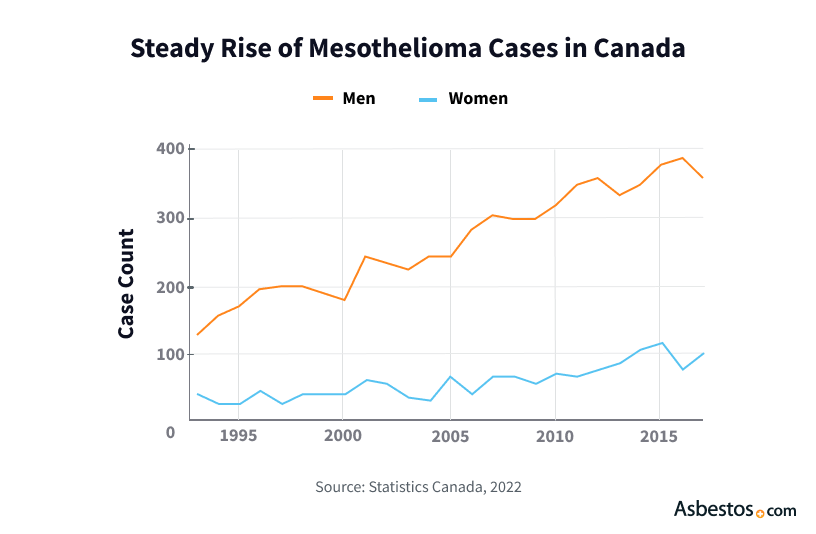The Ottawa, Ontario, resident was diagnosed at age 31. It took an expert pathologist who specialized in mesothelioma to identify the cancer. Jayda was most likely exposed to asbestos as a child through her father, who worked in a lab at a coal mine where he used and tested asbestos products. He also did mechanical work with asbestos parts on the machinery.
Asbestos and Mesothelioma in Canada
Though the Canadian government once supported the industry, the nation banned asbestos in 2018. However, mesothelioma cases continue to rise as workers exposed on the job decades ago begin to show symptoms. In 2022, a total of 472 Canadians died of the asbestos-related disease.

Risk of Mesothelioma in Canada From Asbestos
Occupational asbestos exposure, putting Canadians at risk for mesothelioma, is an ongoing issue in the country. An estimated 235,000 Canadian workers experienced some type of asbestos exposure while on the job. Of these workers, 5% have high exposure, 46% have moderate exposure and 49% have low exposure. Most of these are workers within the construction industry.
Key Facts About Mesothelioma and Asbestos in Canada
- In 2019, the latest year with available incidence data, 460 Canadians received a diagnosis of mesothelioma.
- Asbestos caused 85% of Québec province’s workplace-related illnesses from 2005 to 2015, according to the most recent data available.
- In 2022, the most recent year mortality data was reported, 472 Canadians died of the disease.
- Of those who died of mesothelioma in 2022, 80% were men.
Canada has a long history of asbestos use. Canada was once the world’s top asbestos producer after the discovery of deposits in the Thetford Mine of Québec. There was even a Canadian town that was named Asbestos in 1899, which changed its name to Val-des-Sources in 2020. While asbestos mines like Québec’s Thetford have closed, as have asbestos manufacturing plants, the latency period between exposure and when symptoms present is between 20 to 60 years.
Direct use and handling has declined, but legacy asbestos remains in older buildings. Anyone who spends a lot of time in these aging structures has a higher risk of developing an asbestos-related illness. Legacy asbestos is a big risk factor for mesothelioma cancer. Many Canadians also continue to receive diagnoses of other asbestos-related diseases today like lung cancer and asbestosis.
Mesothelioma Cancer and Canadians
Most cases of mesothelioma in Canada stem from inhaling asbestos while at work. Family members can also be exposed when someone with primary exposure accidentally brings home asbestos fibers on their hair, clothes, skin or shoes. Asbestos fibers easily break down into dust and float through the air. When an individual breathes these particles in, they get trapped within the sensitive tissues of the chest and abdomen, leading to years of irritation. This irritation can change the DNA of cells, causing them to become cancerous.
This malignant cancer can develop in the lining around the lungs (pleural mesothelioma), heart (pericardial mesothelioma), abdomen (peritoneal mesothelioma) or testes (testicular mesothelioma). About 80% of mesothelioma cases are pleural. Common symptoms of mesothelioma include cough, shortness of breath, fatigue and chest pain.
Mesothelioma can take between 20 and 60 years to develop into disease and manifest symptoms. This latency period makes getting an early diagnosis difficult, with many cancers diagnosed only after they develop into later stages.
I wasn’t caught totally off guard with my diagnosis. It just took 48 years before the effects of my asbestos exposure finally showed up.
Mesothelioma Cases Continue to Rise
The annual mesothelioma rate in Canada has jumped from 75 cases in 1993 to 250 in 2017 and again to 460 diagnosed cases in 2019. The disease’s extended latency period of decades means that new cases will likely continue to emerge for some time.
The rate of this cancer in men aged 60 and under has slightly declined. However, rates of mesothelioma in women have increased.

Sites Known for Asbestos Exposure in Canada
Some of the highest rates of mesothelioma occur in Québec and Vancouver, where mining and shipyards were major employers. Though Canada’s asbestos mines closed, these sites can still pose a public health risk. For example, a 2022 study determined Québec’s Lake Becancour contains sediment with up to 4.4% asbestos by weight.
Mines in Québec dumped hundreds of millions of tons of asbestos tailings into the Bécancour River basin for more than 100 years. Restorative efforts now focus on dealing with mining debris and reshaping the former lake pit into a sediment control site. Ongoing studies are investigating asbestos fiber contamination in nearby lakes and sediments.
Canadian Sites Linked to Asbestos Exposure
- Chemical Valley: Roughly 40% of Canada’s chemical industry is near Sarnia in Ontario in an area known as “chemical valley.” It’s estimated that thousands of pipes running through the valley were covered in asbestos insulation and much of it still remains.
- Jeffrey Mine: Located in Val-des-Sources (formerly called Asbestos), Québec, the mine opened in 1879 and closed in 2011. It’s the largest asbestos open pit in the world at roughly the size of 170 American football fields.
- Lac d’Amiante: This asbestos mine in the Thetford Mines area of Québec was also known as the Black Lake Mine, Lake Asbestos Mine and LAB Mine began construction between 1955 and 1958 following the draining of Black Lake. It became one of the top 3 global asbestos producers and closed in 2011.
- Mines across Canada: In addition to the top producing mines, additional mines that once operated include the Clinton Creek Mine in Yukon; Cassiar Mine in British Columbia; Van Packer Mine, Munro Mine in Ontario; Advocate Mine in Newfoundland; and Bell Mine, King Mine, Beaver Mine, Johnson Mine, Flintkote Mine, QAC Mine, Carey Mine and Nicolet Mine in Québec.
- Shipyards: At the start of World War II, Canada had 3 shipyards. This was expanded to 90 facilities with more than 126,000 men and women working to produce 4,047 naval vessels during the height of heavy asbestos use in shipbuilding.
In addition to these industrial sites and mines, Canadians also face exposure to legacy asbestos in a number of historic sites and federal buildings across the country. The Government of Canada reports more than 200 federal properties are currently known to contain asbestos.
These include: the Information Centre in Banff, Alberta; the SS Klondike Visitor Centre at the SS Klondike National Historic Site in Whitehorse, Yukon; and the Georgina Point Light Keepers House in Southern Gulf Islands, British Columbia. The list also includes a wide variety of other structures like administrative buildings, caretaker’s cottages and golf course clubhouses.
Occupational Asbestos Exposure in Canada
Canadian workers are still at risk of exposure across many industries, especially those who spend significant time in older buildings. Asbestos use in building materials was at its height before the 1980s. Insulation, roofing shingles, paint and floor and ceiling tiles are some of the biggest categories of asbestos-containing products.
Higher-Risk Occupations in Canada
- Carpenters
- Construction workers
- Insulation installers
- Military service personnel
- Miners
- Nuclear facility workers
- Plumbers
- Roofers
- Ship loaders
- Shipbuilders
- Textile workers
- Truck drivers
Demolition and remodeling of older buildings is often dangerous because it disturbs the asbestos. The material is most hazardous when the fibers get crushed. Asbestos dust becomes airborne, making it easier to breathe in. Breaking any product made with asbestos releases tiny fibers into the air that are a health threat to anyone nearby.

Understand your diagnosis, top doctors and ways to afford care.
Get Your Free GuideIs Asbestos Banned in Canada?
Canada officially banned asbestos in 2018 with the Prohibition of Asbestos and Products Containing Asbestos Regulations. However, some industries received an exemption to continue legally using the toxic mineral within stated regulations.
The military and nuclear energy industries have until 2029 to phase out asbestos use. The deadline is 2030 for the chloralkali industry. Another notable exception is magnesium extraction companies, which can continue to use asbestos mining waste.
The government has also moved toward restricting talc products such as cosmetics. Canada will likely label talc as an official toxic substance because of frequent asbestos contamination. Some Canadians may be able to file lawsuits involving asbestos-contaminated talc.
Compensation for Asbestos Exposure in Canada
Some Canadian residents may be eligible for compensation if their exposure happened on the job as a result of an employer’s negligence. Provincial governments have a system in place to pay patients and families experiencing the impacts of asbestos in Canada. Anyone whose exposure occurred while living or working in the United States can file a claim in the U.S. to seek compensation.
Speak with an experienced attorney specializing in asbestos-related illnesses to determine if your case qualifies you for compensation from a trust fund or lawsuit. You must have proof of your diagnosis and evidence of asbestos exposure. Most eligible people can receive compensation in three to six months.
Asbestos Lawsuits and Trust Funds for Canadians
Mesothelioma patients in Canada have the option to file either a lawsuit or trust fund claim to get financial compensation. Family members who have lost a loved one to mesothelioma can also file a lawsuit to pursue a wrongful death claim.
Patients and families can use the money to help cover the cost of medical bills, lost work and other expenses related to their diagnosis. Eligible residents can pursue additional options for compensation or financial assistance through the Canada Pension Plan, WorkSafeBC disability pension or Veterans Affairs, which offers disability pensions and class action lawsuits.

Access trust funds and grants to ease the cost of your treatment.
Get Help NowMesothelioma Treatment in Canada
Canada’s socialized medical model makes treatment options for mesothelioma accessible to many patients. Doctors use a multimodal approach to treat mesothelioma. Surgery, chemotherapy, radiation and immunotherapy are frequent methods of treatment. Some patients may also be eligible for clinical trials.
Heated intraperitoneal chemotherapy and cytoreductive surgery have proven safe and effective for some individuals with peritoneal mesothelioma. In patients with pleural mesothelioma, adding Keytruda (pembrolizumab) to standard chemo treatments can increase survival rates.
Canadian Treatment Centers
Mesothelioma treatment centers provide a wide range of options to patients. The treatment center that’s right for you depends on factors like the type of mesothelioma you have, how far your cancer has progressed and your ability to travel for care. Some centers also take patient age and overall health into consideration.
Speak with your doctor regarding your options for treatment to get recommendations on the best options for you. Discuss your goals and plans with your family as well. It’s important to have a support system to rely on as you focus on your treatment.
Top Mesothelioma Treatment Centers in Canada
| CENTER/INSTITUTE | LOCATION |
|---|---|
| Cross Cancer Institute at U of Alberta | Edmonton, Alberta |
| Princess Margaret Cancer Centre | Toronto, Ontario |
| Vancouver Cancer Centre | Vancouver, British Columbia |
| McGill University Health Centre | Montreal, Québec |
| The Ottawa Hospital Regional Cancer Centre | Ottawa, Ontario |
Mesothelioma Specialists in Canada
You can find a variety of Canadian healthcare providers familiar with asbestos-related diseases, including oncologists, radiologists and surgeons. The number of doctors who specialize in treating mesothelioma continues to increase.
Seek out medical practitioners who have experience and training in treating mesothelioma. Their specialized knowledge and skill sets allow them to provide the best possible care.
| MESOTHELIOMA DOCTOR | LOCATION |
|---|---|
| Robert MacRae, M.D. | Ottawa, Ontario |
| Christopher Lee, M.D. | Vancouver, British Columbia |
| Rufus Scrimger, M.D. | Edmonton, Alberta |
| Marc de Perrot, M.D. | Toronto, Ontario |
| Walley Temple, M.D. | Calgary, Alberta |
Clinical Trials
You may want to consider participating in a clinical trial. The Canadian Cancer Society and the U.S. National Cancer Institute often work together on clinical trials that test the safety and effectiveness of emerging mesothelioma treatments and refine existing therapies.
One current clinical trial open to eligible candidates is taking place at the Princess Margaret Cancer Centre in Toronto, Ontario. This study is researching the safest effective dose of a new type of radiation after surgery. It ends in 2025.
An excellent source to check for open clinical trials throughout Canada is the Government of Canada website. If you’re considering a clinical trial, speak with your doctor about eligibility.
Common Questions About Asbestos in Canada
- What year was asbestos banned in Canada?
-
Canada banned asbestos in 2018 with the Prohibition of Asbestos and Products Containing Asbestos Regulations, but left several legal exemptions. The military and nuclear energy industries can use asbestos until 2029, while the chloralkali industry has until 2030 to stop usage. Magnesium extraction companies can continue to produce asbestos mining waste.
While all asbestos mines closed by 2011, many older buildings still pose an exposure risk as they contain materials made with asbestos.
- How many people died as a result of asbestos in Canada?
-
Recent mesothelioma rate statistics show that cases steadily increased over the years, reaching 460 diagnoses in 2019. An estimated five Canadians receive an asbestos-related diagnosis every day.
2022 statistics reported 472 deaths from mesothelioma. 377 of these were men and 95 were women.
- Where did asbestos have the most impact in Canada?
-
The regions in Canada that experienced the most impact from asbestos were those that contained large mineral deposits where workers mined and transported the material. This includes British Columbia, Newfoundland, Quebec and Yukon. Miners, along with truck drivers and ship loaders, had high levels of exposure daily.




